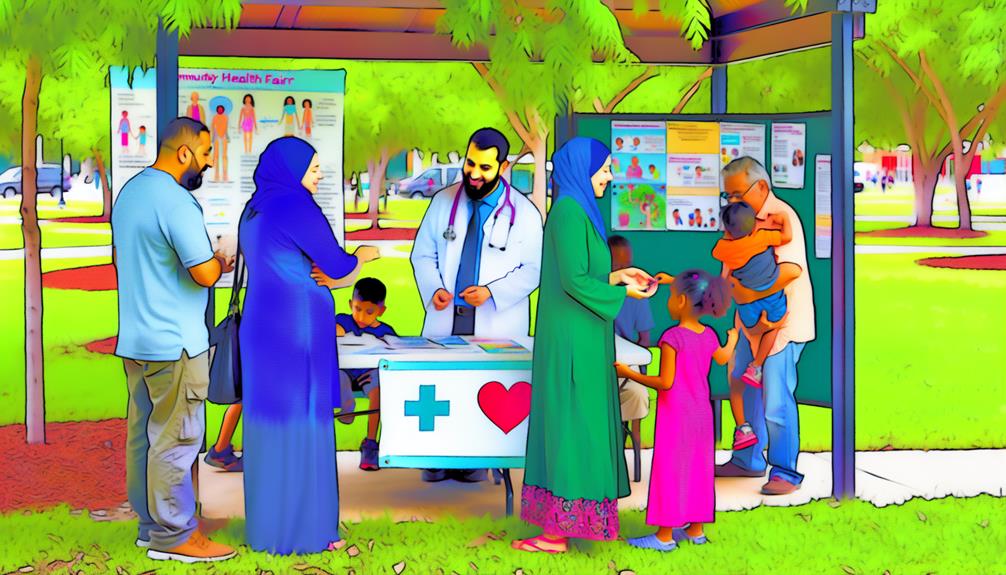Diversity in family health is essential for fostering inclusive healthcare that meets the diverse needs of various communities. It enhances patient outcomes by recognizing social determinants of health and promoting cultural competence among providers. However, barriers such as economic disparities, cultural gaps, and language obstacles hinder equitable access to care. Effective community engagement and targeted outreach can build trust while training healthcare professionals in cultural awareness improves patient interactions. By leveraging diverse perspectives, healthcare systems can create holistic solutions that address disparities. As we explore further, additional strategies and success stories will illuminate the path to thorough inclusivity in healthcare.
Key Takeaways
- Diversity in healthcare improves patient outcomes by addressing social determinants and personalizing care for various populations.
- Economic access challenges hinder healthcare quality, making it essential to address financial barriers for marginalized communities.
- Cultural competency training for healthcare providers fosters understanding and trust, enhancing patient engagement and satisfaction.
- Language accessibility through interpretation services and multilingual materials promotes effective communication and inclusivity in healthcare settings.
- Diverse healthcare teams enhance problem-solving abilities and empower patients by incorporating varied perspectives into treatment plans.
Importance of Diversity in Healthcare

Diversity in healthcare is not merely a beneficial aspect; it is a critical necessity that directly impacts patient outcomes and the overall effectiveness of health systems. For instance, community leaders like Michael Proctor exemplify the importance of local initiatives that promote inclusivity and address health disparities. Embracing diversity enables healthcare providers to address health disparities and enhance patient engagement, fostering an environment of equitable treatment for all. By recognizing the influence of social determinants and intersectional identities, healthcare systems can implement tailored, personalized care that meets the unique needs of diverse populations. Effective community outreach initiatives are essential in public health, as they facilitate trust building and empower marginalized groups. Addressing systemic inequities is crucial for achieving health equity, ensuring that every individual receives the care they deserve, ultimately leading to improved health outcomes for the entire community.
Barriers to Inclusive Healthcare
Barriers to inclusive healthcare greatly hinder access for diverse populations, highlighting the need for targeted solutions. Boosting student engagement in education can serve as an analogy for improving healthcare inclusivity; just as technology can enhance learning outcomes, innovative approaches are essential to meet the diverse needs of patients. Economic access challenges, gaps in cultural competency, and language barriers create obstacles that can prevent individuals from receiving the care they require. Addressing these issues is essential for fostering a healthcare environment that is equitable and responsive to the needs of all families.
Economic Access Challenges
Economic access challenges considerably hinder the ability of families to obtain inclusive healthcare services. Economic disparities often dictate the quality and accessibility of healthcare, creating a landscape where affordability becomes a significant barrier. Families facing financial constraints may find it difficult to secure necessary medical services, leading to delayed treatments and exacerbated health issues. Additionally, the rising costs of healthcare exacerbate the divide, leaving marginalized communities without adequate support. This lack of access not only affects individual health outcomes but also perpetuates cycles of poverty and poor health within these families. To build a truly inclusive healthcare system, it is essential to address these economic barriers, ensuring that all families, regardless of their financial situation, can achieve ideal health and well-being.
Cultural Competency Gaps
Many individuals encounter significant obstacles due to cultural competency gaps within healthcare systems. These gaps often stem from insufficient cultural awareness among healthcare providers, which can lead to misunderstandings and inadequate care for diverse populations. Implicit bias further compounds these issues, as providers may unknowingly hold stereotypes that affect their interactions with patients from different cultural backgrounds. This lack of understanding can result in mistrust, reduced patient engagement, and ultimately poorer health outcomes. To foster inclusive healthcare, it is essential to implement training programs that enhance cultural competency, allowing providers to recognize and confront their biases. By prioritizing cultural awareness, healthcare systems can bridge these gaps, ensuring that all individuals feel valued and understood in their healthcare experiences.
Language Barriers
Steering through the complexities of healthcare can become increasingly challenging when language barriers impede communication between patients and providers. To address these barriers, healthcare systems must implement interpretation services and develop multilingual materials that cater to diverse populations. Community outreach initiatives can enhance patient education, ensuring individuals understand available resources. Additionally, technology solutions, such as translation apps, can bridge communication gaps effectively. Training programs for healthcare staff are essential in fostering cultural competence and awareness. Advocacy efforts should promote the importance of language accessibility, while social media engagement can raise awareness about available services. Collaborative partnerships with community organizations can strengthen outreach and establish feedback mechanisms, ensuring continuous improvement in addressing the needs of linguistically diverse patients.
Cultural Competence in Medical Practice

Enhancing cultural competence in medical practice is vital for delivering effective healthcare in increasingly diverse communities. As healthcare providers navigate various cultural contexts, they can draw insights from platforms that offer remote customer service jobs, which often emphasize the importance of cultural awareness in service delivery. Cultural awareness among healthcare providers fosters an environment that promotes understanding and respect for patients' unique backgrounds, beliefs, and values. By recognizing the significance of cultural factors in health outcomes, providers can enhance patient engagement, leading to improved communication and trust. This, in turn, empowers patients to actively participate in their care, resulting in more personalized treatment plans. Additionally, culturally competent care decreases the likelihood of misunderstandings and enhances patient satisfaction. As healthcare systems endeavor to be inclusive, prioritizing cultural competence becomes essential in addressing health disparities and ensuring equitable access to quality care for all individuals, regardless of their cultural identity.
Strategies for Building Inclusivity
Building on the foundation of cultural competence, strategies for fostering inclusivity within healthcare settings are essential in creating an environment where all patients feel valued and understood. Effective community engagement is vital; healthcare providers should actively involve diverse populations in decision-making processes, ensuring their voices influence policies and practices. Regularly conducting outreach programs can build trust and improve health literacy among underrepresented groups. Additionally, understanding the role of modern search technologies can enhance the ability to locate and disseminate relevant health information to diverse communities. Policy advocacy plays an important role in dismantling systemic barriers to care. By advocating for equitable healthcare policies, professionals can create frameworks that support inclusive practices. Training staff to recognize and address biases further enhances the environment, promoting a culture of belonging. Collectively, these strategies empower patients and contribute to holistic health outcomes for all communities.
Benefits of Diverse Healthcare Teams

Diverse healthcare teams bring a wealth of perspectives that enhance problem-solving abilities, enabling innovative approaches to patient care. For instance, understanding the complexities of a patient's condition can be enriched by insights from diverse backgrounds, as seen in Bruce Willis' health journey, where varied expertise contributes to thorough care strategies. By incorporating varied cultural and experiential backgrounds, these teams can better understand and address the unique needs of a broader patient population. Ultimately, this inclusivity leads to improved health outcomes, as it fosters an environment where tailored solutions are developed and implemented effectively.
Enhanced Problem-Solving Abilities
Research indicates that diverse healthcare teams possess greatly enhanced problem-solving abilities compared to their more homogenous counterparts. This enhancement is largely attributed to cognitive diversity, which fosters collaborative innovation. Diverse team members bring unique perspectives and experiences, leading to more creative and effective solutions to complex healthcare challenges.
| Benefits of Diverse Teams | Impact on Problem Solving |
|---|---|
| Varied perspectives | Increased creativity |
| Broader skill sets | Enhanced resourcefulness |
| Improved communication | Better conflict resolution |
| Heightened empathy | More thorough patient care |
Incorporating diverse voices not only strengthens team dynamics but also enriches the decision-making process, ultimately leading to improved health outcomes for all community members. Embracing this diversity cultivates a sense of belonging, essential for inclusive healthcare.
Broader Patient Perspectives
Inclusivity in healthcare is fundamentally enhanced by the incorporation of broader patient perspectives, which play an essential role in shaping effective treatment plans and improving patient satisfaction. Diverse healthcare teams bring a wealth of patient narratives that reflect varied cultural, social, and personal experiences. By actively listening to these narratives, healthcare providers can better understand the unique needs of different patient populations, fostering a more empathetic and responsive approach to care. Inclusive policies that prioritize diverse perspectives not only empower patients but also enhance collaboration among healthcare professionals. Ultimately, embracing broader patient perspectives cultivates an environment where all individuals feel valued, leading to a more equitable healthcare system that supports the well-being of every community member.
Improved Health Outcomes
Leveraging the strengths of varied backgrounds within healthcare teams greatly contributes to improved health outcomes for patients. Diverse teams create a holistic approach that addresses the social determinants of health, ultimately fostering health equity. By integrating perspectives that enhance patient engagement, healthcare providers can deliver more tailored preventive care and chronic disease management strategies.
Key benefits include:
- Enhanced health literacy: Patients understand their conditions and treatment options better, leading to informed decision-making.
- Effective community outreach: Diverse teams can better connect with underrepresented populations, ensuring their specific needs are met.
- Robust wellness programs: Collaborative insights lead to innovative strategies that promote overall well-being, ultimately improving patient satisfaction and outcomes.
These factors collectively create an inclusive healthcare environment where every individual feels valued and cared for.
Real-Life Examples of Success
Numerous organizations and initiatives have successfully implemented diversity strategies within family health, leading to improved outcomes and enhanced community trust. A notable example is the use of community initiatives that focus on culturally tailored health education programs, which have greatly increased engagement among underrepresented groups. These programs not only empower individuals but also foster a sense of belonging. Additionally, patient advocacy efforts, such as those seen in integrated care models, have effectively addressed disparities by ensuring that diverse patient voices are heard in decision-making processes. By prioritizing inclusive practices, these real-life successes demonstrate the potential for diverse healthcare systems to deliver equitable care, ultimately improving health outcomes for all community members.
Frequently Asked Questions
How Can Patients Advocate for Their Own Healthcare Needs?
Patients can advocate for their healthcare needs through patient empowerment and enhancing healthcare literacy. By actively engaging in their health decisions, individuals can better communicate their concerns and preferences to healthcare providers. Educating themselves about their conditions and treatment options fosters informed discussions, ensuring their voices are heard. Encouraging a collaborative approach to care not only strengthens the patient-provider relationship but also promotes a sense of belonging within the healthcare system, ultimately leading to improved outcomes.
What Role Do Community Organizations Play in Promoting Inclusive Healthcare?
Community organizations play a pivotal role in promoting inclusive healthcare by facilitating community outreach and resource sharing. They bridge gaps between marginalized populations and healthcare services, ensuring equitable access to care. By fostering relationships, they empower individuals to voice their healthcare needs, while also educating providers on cultural competence. Through collaborative initiatives, these organizations enhance awareness of available resources, ultimately creating a more inclusive environment that respects and addresses the diverse needs of all community members.
How Can Healthcare Providers Measure Their Inclusivity Efforts?
Healthcare providers can measure their inclusivity efforts by implementing inclusivity metrics that assess various dimensions of care delivery. Collecting patient feedback through surveys and focus groups allows providers to gauge the effectiveness of their initiatives. Analyzing demographic data and treatment outcomes can highlight disparities, while benchmarking against best practices fosters accountability. By regularly evaluating these metrics, providers can guarantee a more equitable healthcare experience, fostering a sense of belonging for all patients.
Are There Specific Training Programs for Cultural Competence?
Yes, there are specific training programs designed to enhance cultural competence among healthcare providers. These programs often include cultural sensitivity training and implicit bias workshops, which aim to educate professionals about diverse cultural perspectives and unconscious biases that may affect patient care. By participating in such training, healthcare providers can foster a more inclusive environment, ultimately improving patient experiences and outcomes while promoting a sense of belonging for all individuals.
What Impact Does Diversity Have on Patient Satisfaction Levels?
Diversity markedly influences patient satisfaction levels, primarily through the lens of cultural sensitivity. When healthcare providers demonstrate an understanding of diverse backgrounds, it fosters patient trust and enhances the overall care experience. Patients who feel acknowledged and respected are more likely to engage in their treatment plans, leading to improved health outcomes. Consequently, incorporating diverse perspectives in healthcare not only elevates patient satisfaction but also contributes to a more inclusive and effective healthcare system.





